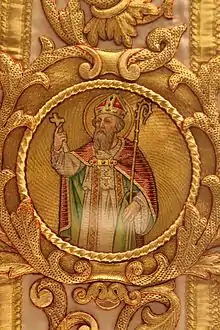Rumbold of Mechelen
Saint Rumbold (or Rumold, Romuold, Latin: Rumoldus, Dutch: Rombout, French: Rombaut) was an Irish or Scottish Christian missionary, although his true nationality is not known for certain.[1][2][3] He was martyred near Mechelen by two men, whom he had denounced for their evil ways.[4]
Saint Rumbold | |
|---|---|
 Saint Rumbold on a chasuble in the Basilica of Our Lady of Hanswijk, Mechelen | |
| Born | possibly Ireland or Scotland |
| Died | 6th, 7th or 8th century (see text) Mechelen |
| Venerated in | Catholic Church Western Rite Orthodoxy |
| Major shrine | St Rumbold's Cathedral in Mechelen |
| Feast | 24 June |
| Attributes | Depicted as a Bishop with a missioner's cross, or a bearded man with a hoe lying under his feet. He may also be shown murdered near a coffer of money. |
| Patronage | Mechelen and Humbeek |
Saint Rumbold's feast day is celebrated by the Roman Catholic Church, and Western Rite Orthodox Churches, on 24 June;[4][5] and it is celebrated in Ireland on 3 July.[6][7] He is the patron saint of Mechelen,[4] where St. Rumbold's Cathedral possesses an elaborate golden shrine on its high altar, containing relics attributed to the saint. It is rumoured that his remains are buried inside the cathedral. Twenty-five paintings in the choir illustrate his life.
Life and legend
Rumbold is assumed to have been consecrated a regionary Bishop at Rome. Aodh Buidhe Mac an Bhaird (c. 1590–1635) argued that Rumbold had been born in Ireland. He is also said to have been a Bishop of Dublin, the son of a Scottish king,[4] and the brother of St. Himelin.[8] He is assumed to have worked under St. Willibrord in the Netherlands and Brabant, and also to have been a close companion of the hermit St. Gummarus,[9][1][4][10] and of the preacher monk Fredegand van Deurne, who, according to one tradition, maintained contact with St. Foillan (who was murdered in the Sonian Forest around 665).[11]
St. Rumbold's biography, written around 1100 AD by Theodoricus, prior of Sint-Truiden Abbey, caused 775 to be the traditional year of the saint's death. The surrounding areas of Mechelen however, had been Christianized much earlier.[1] In 2004 a state-of-the-art examination of the relics assumed to be St. Rumbold's showed a death date between 580 and 655.[2][3][12] This would make Saint Rumbold a Hiberno-Scottish rather than an Anglo-Saxon missionary, and not a contemporary of either St. Willibrord, St. Himelin, or St. Gummarus.[2]
St. Rumwold of Buckingham
There has been some historical confusion between Rumbold of Mechelen and the infant Saint Rumwold of Buckingham, who died in 662 AD at the age of 3 days. The latter has become referred to as Romwold, Rumwald, Runwald, Rumbald, or Rumbold. A compilation of three saints' lives as translated by Rosalind Love mentioned that on 15th-century records in Salisbury, an unknown author 'corrected' the attribution as "martyr" (possibly the Rumbold murdered in Mechelen) by annotating "confessor" (fitting in the miraculous infant Rumwold who was not a martyr). Also, the original dedication of churches to a St. Rumbold in Northern England appears uncertain.[13]
Gallery
 St. Rumbold's statue in St. Rumbold's Cathedral, Mechelen, situated through the arch on the right side.
St. Rumbold's statue in St. Rumbold's Cathedral, Mechelen, situated through the arch on the right side. Saint Rumbold on a painting in the Basilica of Our Lady of Hanswijk, Mechelen.
Saint Rumbold on a painting in the Basilica of Our Lady of Hanswijk, Mechelen. Relics attributed to Saint Rumbold in their shrine, carried along Veemarkt (Cattle Market), Mechelen.
Relics attributed to Saint Rumbold in their shrine, carried along Veemarkt (Cattle Market), Mechelen. Saint Rumbold's statue in the Basilica of Our Lady of Hanswijk, Mechelen.
Saint Rumbold's statue in the Basilica of Our Lady of Hanswijk, Mechelen. St. Rumbold's Cathedral, Mechelen,treasury of St. Rumbold's reliquary shrine.
St. Rumbold's Cathedral, Mechelen,treasury of St. Rumbold's reliquary shrine. St. Rumbold's Cathedral; at the far end stands the statue of Sanctus Rumoldus, aka Saint Rumbold, above the high altar.
St. Rumbold's Cathedral; at the far end stands the statue of Sanctus Rumoldus, aka Saint Rumbold, above the high altar.
References
- "Lezing over Sint-Rombout in Mechelen – Sint-Rombout: waarheid of legende? (Presentation for a 20 May 2010 lecture)" (in Dutch). Persdienst Aartsbisdom (Archbishopric Press Service), Mechelen / Vrienden van de Sint-Romboutskathedraal vzw. 2010. Archived from the original on 27 September 2011. Retrieved 5 Jul 2011.
- Mark van Strydonck, Anton Ervynck, Marit Vandenbruaene and Mathieu Boudin (2006). Relieken, echt of vals? (in Dutch). Davidsfonds, Leuven. ISBN 978-90-5826-420-6.CS1 maint: uses authors parameter (link)
- "De relieken van Sint-Rombout" (in Dutch). Torens aan de Dijle vzw (Cooperation between representatives of 8 historical churches at Mechelen, and the City). 2011. Archived from the original on 2012-03-26. Retrieved 5 Jul 2011.
- "St Rumbold". Catholic Online. 2011. Retrieved 5 Jul 2011.
- "Latin Saints of the Orthodox Patriarchate of Rome – 'R' (for Rumoldus)". Retrieved 5 Jul 2011.
- Dries van den Akker s.j. (13 Sep 2010). "Rombout van Mechelen" (in Dutch). www.heiligen.net. Retrieved 9 July 2011.
- "Saint of the Day: 3 July - Index: Rumold(us)". St. Patrick Catholic Church, Washington, D.C, U.S.A. Retrieved 9 July 2011.
- Saint Patrick's Church: Saints of March 10
- Mulder-Bakker, Anneke; Carasso-Kok, Marijke (1997). Gouden legenden : heiligenlevens en heiligenverering in de Nederlanden. Verloren. p. 145. ISBN 9065502912.
- T. Paaps: Het leven van de heilige Gummarus. In Dutch, originally from 1940, but rewritten in 2008 by Hugo Neefs and republished by "de Gilde Heren van Lier".
- Dries van den Akker s.j. (10 August 2010). "Fredegand van Deurne" (in Dutch). www.heiligen.net. Retrieved 9 July 2011.
- van Eck, Xander (2015). "The high altar of the archiepiscopal cathedral of Mechelen: St Rumbold's grand reliquary and tomb". Simiolus: Netherlands Quarterly for the History of Art. 38 (4): 213–227. ISSN 0037-5411. JSTOR 26382631.
- Love, Rosalind C. (1996). excerpts about 'St. Rombaut' (Rombout). Three Eleventh-Century Anglo-Latin Saint's Lives — Vita S. Birini, Vita et Miracula S. Kenelmi, Vita S. Rumwoldi. pp. cxliii–cxliv, cli, cliv. ISBN 0-19-820524-4. Retrieved 26 July 2011.
External links
| Wikimedia Commons has media related to Saint Rumbold. |